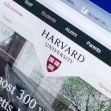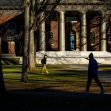A federal judge has temporarily halted the Trump administration’s effort to revoke Harvard University’s certification under the Student and Exchange Visitor Program (SEVP), preserving the university's ability to enroll international students. Harvard University filed a lawsuit last Friday challenging the administration’s decision, arguing it was retaliatory and violated multiple constitutional protections.
The Department of Homeland Security (DHS) had earlier revoked Harvard’s certification under SEVP, alleging that the university failed to comply with requests for certain records. SEVP certification is critical for academic institutions to admit international students legally. According to Harvard, this action threatened the status of approximately 6,800 international students, nearly 27% of its student population.
In its legal challenge, Harvard claims the administration’s move violates the First Amendment, the Due Process Clause of the Constitution, and the Administrative Procedure Act (APA). Harvard argues that the revocation appears politically motivated, specifically tied to disagreements over campus debates related to the recent Israel-Hamas conflict. The university contends that the administration’s actions infringe upon academic freedom and punish the institution for expressing constitutionally protected views.
The lawsuit further alleges violations of due process, highlighting that Harvard was given neither adequate notice nor a fair chance to respond before the SEVP certification was revoked. Harvard asserts that this abrupt decision violates its constitutional right to fair treatment and transparency in government decisions affecting property rights.
Additionally, the university claims the administration violated the Administrative Procedure Act by making an arbitrary, capricious, and unjustified decision. Harvard argues federal agencies must follow specific procedures and provide reasonable justifications for their actions, something the administration allegedly failed to do in this case.
Responding swiftly to Harvard’s lawsuit, U.S. District Judge Allison D. Burroughs issued a temporary restraining order, preventing DHS from enforcing the revocation. A hearing is scheduled for next week to determine if this temporary order will be extended into a preliminary injunction.
In a statement, Harvard President Alan Garber condemned the administration’s decision, calling it an "unlawful and unwarranted action" that threatens the academic future of thousands of students. "This sends a chilling message to educational institutions nationwide and imperils the educational and career aspirations of students who have come to America to pursue their dreams," Garber stated.
The DHS defended its actions by asserting Harvard’s non-compliance with federal policies related to campus safety and antisemitism. The department accused Harvard of creating an environment hostile to Jewish students and promoting pro-Hamas sympathies. These allegations strongly denied by Harvard.






